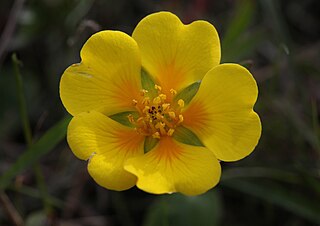
Rosaceae, the rose family, is a medium-sized family of flowering plants that includes 4,828 known species in 91 genera.

The rose subfamily Rosoideae consists of more than 850 species, including many shrubs, perennial herbs, and fruit plants such as strawberries and brambles. Only a few are annual herbs.

The Sayan Mountains are a mountain range in southern Siberia, Russia and northern Mongolia. In the past, it served as the border between Mongolia and Russia.

Potentilla is a genus containing over 300 species of annual, biennial and perennial herbaceous flowering plants in the rose family, Rosaceae.

The Tuvans or Tyvans are a Turkic ethnic group indigenous to Siberia who live in Russia (Tuva), Mongolia, and China. They speak Tuvan, a Siberian Turkic language. In Mongolia they are regarded as one of the Uriankhai peoples.

Potentilla erecta is a herbaceous perennial plant belonging to the rose family (Rosaceae).

Dasiphora fruticosa is a species of hardy deciduous flowering shrub in the family Rosaceae, native to the cool temperate and subarctic regions of the northern hemisphere, often growing at high altitudes in mountains. Dasiphora fruticosa is still widely referenced in the horticultural literature under its synonym Potentilla fruticosa. Common names include shrubby cinquefoil, golden hardhack, bush cinquefoil, shrubby five-finger, widdy, and kuril tea.

Tuva or Tyva, officially the Republic of Tuva, is a republic of Russia. Tuva lies at the geographical center of Asia, in southern Siberia. The republic borders the Altai Republic, Khakassia, Krasnoyarsk Krai, Irkutsk Oblast, and Buryatia in Russia, and shares an international border with Mongolia to the south. Tuva has a population of 336,651. Its capital is the city of Kyzyl.

Campbell's dwarf hamster is a species of hamster in the genus Phodopus. It was given its common name by Oldfield Thomas in honor of Charles William Campbell, who collected the first specimen in Mongolia on July 1, 1902. It is distinguished from the closely related Djungarian hamster as it has smaller ears and no dark fur on its crown. Campbell's dwarf hamster typically has a narrow dorsal stripe compared to the Djungarian hamster and grey fur on the stomach. This hamster may be raised in captivity and kept as a small pet.

Potentilla hickmanii is an endangered perennial herb of the rose family. This rare plant species is found in a narrowly restricted range in two locations in coastal northern California, in Monterey County, and in very small colonies in San Mateo County. This small wildflower, endemic to western slopes of the outer coastal range along the Pacific Ocean coast, produces bright yellow blossoms through spring and summer.

Sibbaldiopsis is a genus in the plant family Rosaceae. This genus only contains a single species: Sibbaldiopsis tridentata, formerly Potentilla tridentata. Commonly, its names include three-toothed cinquefoil, shrubby fivefingers, and wineleaf. Systemic phylogenetic work has placed S. tridentata within Sibbaldia as Sibbaldia retusa.

Potentilla robbinsiana, the dwarf mountain cinquefoil or Robbins' cinquefoil, is a small, yellow-flowered, perennial found exclusively above the tree line in the White Mountains of New Hampshire. The plant is nearly stemless and measures two to four centimeters in diameter.

The Marble Mountain Wilderness is a 241,744-acre (978.30 km2) wilderness area located 60 miles (97 km) southwest of Yreka, California, in the United States. It is managed by the United States Forest Service and is within the Klamath National Forest in Siskiyou County. The land was first set aside in April 1931 as the Marble Mountain Primitive Area, which comprised 234,957 acres (950.84 km2). It was one of four areas to gain primitive status under the Forest Service's L-20 regulations that year. In 1964, it became a federally designated wilderness area when the U.S. Congress passed the Wilderness Act.

Potentilla diversifolia or Potentilla × diversifolia is a species of flowering plant in the Rose Family (Rosaceae) known by the common names varileaf cinquefoil, different-leaved cinquefoil, and mountain meadow cinquefoil.

Potentilla flabellifolia is a species of cinquefoil known by the common names high mountain cinquefoil, fanleaf cinquefoil and fan-foil.
Potentilla grayi is a species of cinquefoil known by the common name Gray's cinquefoil.

Monochroa elongella, the Pembroke neb, is a moth of the family Gelechiidae. It is widely distributed throughout Europe. Outside of Europe, it is found in southern Siberia. The habitat consists of coastal sand-dunes and chalk downland.

The Sayan intermontane steppe ecoregion is sometimes referred to as a "steppe island", being an expanse of grassland and shrubs surrounded by mountain forests in the Tyva Republic of south central Siberia, Russia. The Altai Mountains are to the west, the Sayan Mountains to the north, and the Tannu-Ola Mountains to the south. The ecoregion is in the temperate grasslands, savannas, and shrublands biome, and the Palearctic realm, with a Humid Continental climate. For much of its length, it follows the course of the upper Yenisei River. It covers 33,928 km2 (13,100 sq mi).

Potentilla aurea, the golden cinquefoil, is a species of flowering plant in the family Rosaceae. It is native to the mountains of mainland Europe, and has been introduced to Turkey. A number of cultivars are available, including 'Aurantiaca', 'Goldklumpen', and 'Plena'.

















